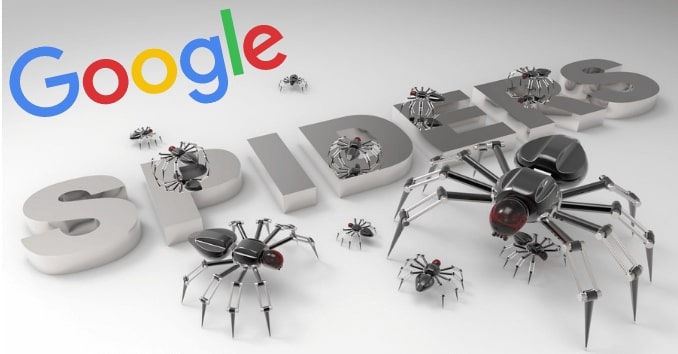The Importance of Website Crawling and Indexing
It is not unusual for people to use an application or equipment and not bother how it works. But if you are a blogger, an online store operator or an affiliate marketer, you need to understand how Google works.
Google is the world’s most used search engine with a market share of about 94%, according to Sparktoro. The remaining 6% of searches are split between platforms like Bing and Baidu etc.
This dominance of Google is maintained by its loyal customer base who prefer using Google over any other search engine due their positive user experience. Google's search engines give more intuitive results than other search engines because of Google’s enhanced search algorithm which sorts out the best combination of results to suit the user's need. This algorithm works on 2 key components, Crawling and Indexing, which determine the ranking of websites.
In this post, we will discuss the specifics and importance of Website crawling and Indexing. More specifically we will answer some of the frequently asked question such as:
What is Website Crawling
What is a Google Web Crawler / GoogleBot / Web Spider
What are the factors to ensure a successful web crawl
What is meant by Indexing of a webpage
What is the importance of Google Indexing
What is the difference between Crawling and Indexing
How does Website Crawling and Indexing help Rank a website
This post is written with an intention to walk you behind the scenes of the search algorithm and what you can do to improve the ranking of your website in Google.
What is Website Crawling
Crawling is a process initiated by Google's search engines where the Google Web Crawler, also known a GoogleBot, visits new and updated webpages on the internet.
For the purposes of Crawling - Google classifies the webpages into 3 categories as below:
Known Pages
These are pages which the GoogleBot has crawled before.
Linked Pages
These are pages which are linked to the Known pages via a URL tag. The tag helps Google navigate to the linked page. This is where Backlinks come into play. If you have a backlink from another website that Google has crawled before , the chances of Google crawling your page increases
Submitted Pages
These are crawling requests submitted by a website owner, of a list of pages (also known as sitemaps), for Google to crawl
The GoogleBot visits all web pages on the internet barring the below:
Pages blocked in robots.txt
A robots.txt is a file which is used to manage the Crawler Traffic to a website. The file tells the Web crawler which pages or files the crawler can’t request to be crawled on.
Any page not accessible by an Anonymous User:
These are generally applicable to pages which require login or have an authorization protection.
Pages already crawled:
Pages which the web crawler has already crawled before or pages which are considered duplicates of another page.

What is a Google Web Crawler?
The web crawler is a program which identifies and analyzes new pages or websites to make a decision if the page or website is worth indexing.
The Web Crawler, commonly referred to as Googlebot or Spiderbot, a name which originates from the way the bot moves from one “web” page to another, takes information from a crawled page, and reports it to Google’s algorithms and servers.
It is important to note that the term Crawling here is synonymous to the word “Read.”
When Google crawls a web page, the bots analyze both the textual and non-textual content of the website along with the overall visual layout to decide where and how it would appear in Search results. The better the bot can understand your page, the better it can match it to people searching for results.
A web crawler is a very important program for Google as there are billions of web pages on the internet and Google can only allocate so much computer power, or resources, for crawling. Hence Google allocates a crawl budget for each website. If Google has previously crawled your content, chances are it may not crawl it again for a while. Hence it’s imperative that you want the crawl to be successful.
For a successful crawl to happen, below are the 3 broad metrics that Spiderbots look for when evaluating a website:
#1 - Structure of the Web Page
A neatly laid out webpage with a harmonious balance of text and pictures along with links.
#2 - Mobile Friendly
Google uses primary and secondary crawlers for crawling a website. The primary crawler for all new websites is mobile crawler hence its important to ensure the webpage is mobile friendly.
#3 - Authoritativeness of the Website
Does the content of the website qualify to be an authority in the particular niche
#4 - Uniqueness of Content
Decide if the content of the website is unique and useful.
Once the spiderbot analyzes a website, it will relay that information to Google servers that the website is good enough to be indexed. Indexing is another aspect on the Google algorithm which is as equally as important to crawling.
What is Website Indexing?
Indexing is the next step of validating a page after the spider bots have crawled on it. In simple terms Indexing translates to how Google interprets what’s on the webpage. The page is analyzed for content, catalogue images and videos to get an understanding of what the page is about. This information is then stored in what is called a Google Index.
Let’s understand what Indexing is with the example of a Library.
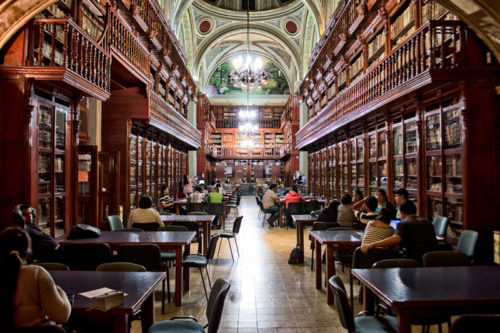
A library holds hundreds of thousands of books, and employs a librarian who indexes these books.
An index is a ledger or a record. Each book also has a marking, called an Index. If you go to a librarian and say, “I need a book about a list of Viruses” , the librarian will consult the ledger (or computer), and tell you that you need to go bookshelf number 91 and on the 19th slot you can find a book titled “An Almanac of Viruses”. They will also tell you that the book has number, like LB. 2395.C65
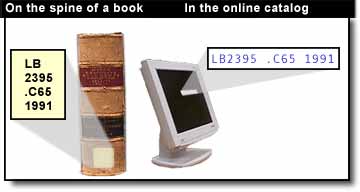
This made your search easier. Instead of you going through each bookshelf, you just ask the librarian.
This is the principle of indexing, which Google does to webpages.
What is the Importance of Google Indexing?
As Google crawls web pages, it also indexes the web pages and categorizes them based on words found on the webpage. If your web page is not indexed, it will never be shown on the search results.
Indexing is simple, but super important.
If your blog post has the words Katy and Perry, the Google indexing machine will think it is about Katy Perry. If someone searches on Google about Katy Perry, then Google may show your website under search results.
What is the difference between Website Crawling and Indexing?
The main difference between crawling and indexing is the activity. A crawl refers to an activity where the spiderbots read your web pages. Indexing, on the other hand, refers to an activity of listing down what the content is all about, and putting it in a position, where its visible to people who are searching for the keyword associated with the page.
If you are operating a website, you can tell Google not to index your page. You can also tell Google not to crawl the page.
Let us go back to the librarian example.
If you tell the librarian not to crawl, they cannot read the contents of the book. However, they can still tell people that there is a book sitting down in a particular shelf.
If you tell the librarian that they can read it, but not index it, then they know what the book is about, but they cannot tell library users where it is. They cannot even tell them that the book exists.
If you want traffic, you want the librarian to crawl and read your website, and you also want the librarian to tell people about your website.
How does Google Web Crawler and Indexing help Rank a Website?
Now, putting it together, how does crawling and indexing help a website?
One Powerful word - Traffic.
If you allow Google to crawl your website, Google will know the content of your web pages. And if you allow Google to index your webpages, that information will be stored in its servers—and Google will point users to your webpage as it deems fit.
Let us say that you wrote an article called “5 Best Exercises to Develop 6-Pack Abs.”
If you let Google crawl your article, it is going to understand that your article contains steps that help a person achieve 6-pack abs.
Once this article is indexed, Google will put this information in its servers.
Now, if someone from another part of the world opens the search engine, and then types “how to get six-pack abs,” Google will present all articles to this user about developing six-pack abs.
See screenshot below:

As you can see, the user now has the option to click any of these articles and read them. If one of these articles is yours, you get a reader to visit your website.
And if this reader visits your website, you now have an opportunity to sell something to this user.
How to get Google to Crawl your Website?
Earlier, we mentioned something about a crawl budget. Only Google knows how many times it will crawl your website, at what time, and how many pages.
This is why each time Google crawls your web page, you must make sure that Google is pleased enough that it will index your web page, and make a decision to present it to its users, especially at the top of the search results pages. This is called optimization, and here are some tips on how to optimize your webpage:
Site Speed
Make sure your web pages load fast; slow websites are bad for customer experience and Google does not like them
Site Map
Creating a sitemap file, and submitting it to Google through Google Search Console boosts up your chances for indexing
Request Indexing
If you publish new content, you need to force Google to crawl it via Live Test in Google Search Console. This way, you can see if there are errors on your page, and then correct them before Google makes a decision about indexing it or not.
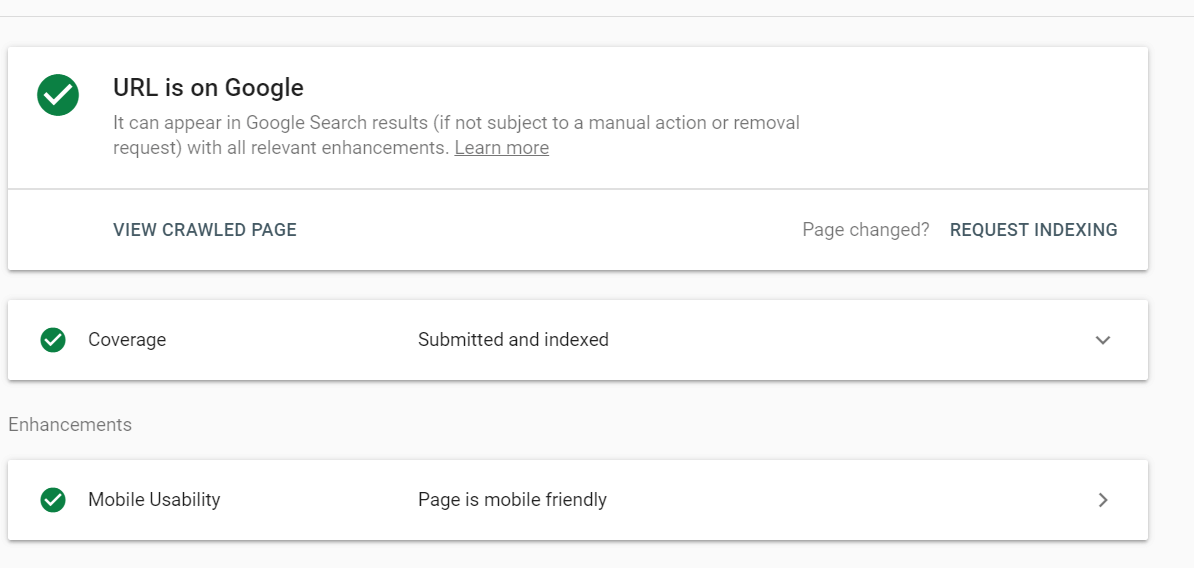
As you can see from the screenshot above, this page is optimized. It is mobile friendly, and Google has already indexed it.
List of things you need to do to Rank your Website
Now, here are some other things that you need to do to be able to rank your website.
Use Keywords
Use the right keywords when writing; use keywords that people are typing on the search engine, and this will help Google show your article to these people.
Learn more about Keywords here
Page Speed
Make sure your website is fast; remove heavy images or compress them. You must also use other techniques, such as using CDN to make sure your web pages are cached.
Learn more about Page Speed Optimization here
Mobile Usability
Ensure that your websites work on mobile; use themes that are built primarily for mobile experience. Learn all about website themes here
Value
The content of your posts must be valuable; avoid writing content that are too short. Make sure that you provide meaningful and accurate information to your users. If Google decides that your content is spammy, it is not going to show your page to its users.
Learn more about SEO optimized content here
So far, these are the four most important aspects you need to focus on. Optimize your webpages for each of the above factors and make sure to let Google know of your presence so your page can be indexed.
Summary: Importance of Crawling and Indexing
Crawling and Indexing are 2 most important aspects in getting your website ranked. Creating an Authoritative content, using the right balance of pictures and texts, maintaining an optimal website speed and keeping your content spam free will raise your chances of getting crawled and indexed by Google. Use the free Google tools to optimize your content, use SEO plugins and tools to ensure your sitemap is upto date so they can tell Google your site meets all the parameters to be indexed.
A great looking webpage may not generate the results or views if it is slow, or has the wrong keywords. With an SEO tool, you can correct these mistakes and make a better content which will increase your rankings in google..
